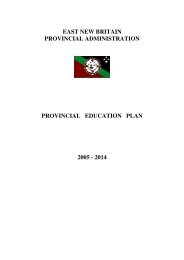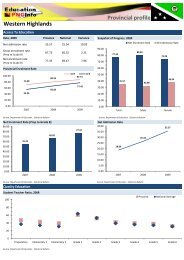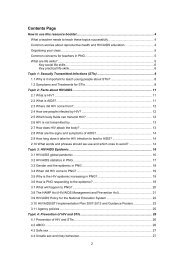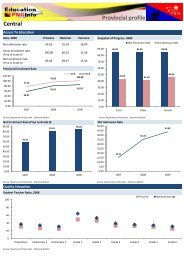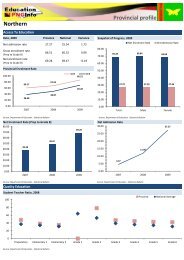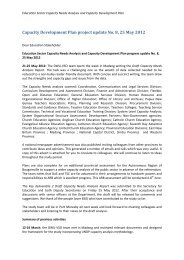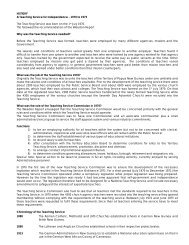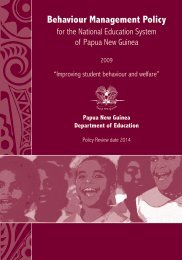Microsoft Photo Editor - COVER - TVET ....jpg
Microsoft Photo Editor - COVER - TVET ....jpg
Microsoft Photo Editor - COVER - TVET ....jpg
You also want an ePaper? Increase the reach of your titles
YUMPU automatically turns print PDFs into web optimized ePapers that Google loves.
Copyright © Department of Education, 2005<br />
Published by Technical Vocational Education and Training Division, Department of<br />
Education<br />
PO Box 446, WAIGANI<br />
National Capital District<br />
Papua New Guinea<br />
All rights reserved. No part of this publication may be reproduced, stored in a retrieval<br />
system, or transmitted in any form or by any means, electronic, mechanical,<br />
photocopying, recording or otherwise, without the prior written permission of the<br />
publisher.<br />
National Library Service Cataloguing-in-Publication:<br />
<strong>TVET</strong> Policy. -- Waigani, [Port Moresby]: Technical Vocational Education and Training,<br />
Department of Education, 2005.<br />
Viii, 23 p.; 29 cm.<br />
ISBN 9980-86-004-9<br />
1. Education and State – Papua New Guinea. 2. Technical Education – Papua New<br />
Guinea. 3. Vocational Education – Papua New Guinea. I. Papua New Guinea.<br />
Department of Education. Technical Vocational Education and Training Division. II.<br />
Training Vocational Education and Training Policy.<br />
371.11309953 -- dc22<br />
Developed with the support of the Australian Government through the Education<br />
Capacity Building Program.<br />
Cover design created by:<br />
Mr. Parks Ike Salanu<br />
Graphics Artist, Skills Resource Training Unit<br />
PNG Employment Oriented Skills Development Project
Message from Minister for Education<br />
Papua New Guinea is rich in natural resources. There are extensive reserves of natural gas and<br />
oil. Mineral deposits of gold and copper abound. The waters around PNG are rich in marine<br />
life. Forest products are major exports and vast timber resource remains largely untapped.<br />
PNG has rich traditions and colorful culture. All these are perfect recipe for a huge economic<br />
development. Despite the availability of these ‘raw materials’ for economic development, the<br />
economy is limping. The advent of new ways in the contemporary Papua New Guinea has set<br />
new targets to reach. Law and order, unemployment, urban drift, corruption, HIV/AIDS,<br />
skilled workforce, economy, equal distribution of wealth, etc, are the overarching concerns.<br />
The National Government has outlined its main policies for economic recovery and<br />
development including human resource development.<br />
Worldwide the output of the Technical Vocational Education & Training (<strong>TVET</strong>) sector<br />
constitutes the majority of the workforce. This category of human capital is in short supply in<br />
Papua New Guinea. There is a need to develop the undeveloped <strong>TVET</strong> sector that will play a<br />
very important role for the economic recovery of Papua New Guinea. Our <strong>TVET</strong> Policy must<br />
pave the way to address these issues immediately. We need to develop our human resources<br />
because they are essential for driving forward the economic development of our country.<br />
The need for changes varies in the contemporary Papua New Guinea society considering<br />
many different cultures and traditions. However, change is not possible without a complete<br />
change of attitudes and level of commitment from people to strive for effective and<br />
sustainable development of our human and natural resources.<br />
The development of the <strong>TVET</strong> Policy is a step forward to enhance commitment to change and<br />
to provide continuous direction for growth and progress in the development of <strong>TVET</strong> sector<br />
consistent with the National Education Plan for 2005 to2014.<br />
It is envisioned that this Policy will eventually see the coordination of a functional <strong>TVET</strong><br />
system that recognizes the alignment of efforts towards PNG’s economic directions and<br />
national training priorities. The ownership of “curriculum content” must be seen as result of<br />
participation by stakeholders with effective leadership and direction for national qualification<br />
framework, and quality regulatory systems in place for all <strong>TVET</strong> providers.<br />
The Department of Education will continue to work together with the Department of Labour<br />
and Industrial Relations, specifically the National Apprenticeship and Trade Testing Board<br />
and the National Training Council, to develop the essential components of a functional and<br />
coordinated <strong>TVET</strong> system.<br />
i
The Policy supports the charter of reforms for the Vocational System for rationalization and<br />
revitalization of vocational centers that will ensure registration and provides clear mandate to<br />
bring about stronger and effective community and industry linkages. The reform will provide<br />
the essential requirement to have a clear role and status at all levels of both national and<br />
community organizations and the functions. The overall <strong>TVET</strong> professional human resource<br />
development is essential as the performance of the system is highly dependent upon the<br />
performance and capacity of its leaders.<br />
I am pleased to have been part of the development of such an important document and to<br />
witness its completion. The <strong>TVET</strong> Policy, I believe, has been pending for some time and look<br />
forward to its implementation.<br />
I thank all who have contributed towards the development of the Policy and the overall<br />
continued growth and development of <strong>TVET</strong> in the last decade and look forward to your<br />
continued support for the next decade and beyond.<br />
HONOURABLE MICHAEL LAIMO, CBE MP<br />
Minister for Education<br />
July 2005<br />
ii
Message from Secretary for Education<br />
The completion of the Technical Vocational Education and Training (<strong>TVET</strong>) Policy<br />
represents a milestone in the development of skilled human resources for Papua New Guinea.<br />
It is the first ever National Policy formulated by the National Department of Education for the<br />
development of the skilled to technician levels of the workforce. It comes in two parts: The<br />
Main Policy Document, and the Policy Rationale and Action Plans.<br />
The Policy presents the vision, rationale, strategies and action plan that would bring the public<br />
<strong>TVET</strong> system to higher levels of quality and efficiency. The development of the competitive<br />
and technically skilled and competent workers with positive work values is essential for the<br />
economic recovery and growth of the nation.<br />
The Medium Term Development Strategy (2005-2010) is the Government’s program for<br />
recovery and development and it has three inter- related objectives- good governance, exportdriven<br />
economic growth and rural development, and poverty reduction.<br />
The Policy implementation poses much greater challenges that will require greater<br />
partnerships with every stakeholder in the <strong>TVET</strong> system. The managers and teachers of the<br />
public <strong>TVET</strong> institutions and head office personnel are expected to play their vital roles with<br />
unwavering commitment and support.<br />
I wish to sincerely thank all who provided the guidance and support to complete this Policy,<br />
in particular, AusAID and other donor agencies, the line Departments, NGOs, Private and<br />
public <strong>TVET</strong> institutions and Provincial and National Education divisional personnel.<br />
As we move forward to implement this Policy, let us continue to build on our partnerships<br />
and collaboration. We create synergy that will propel us to attain the vision of a better quality<br />
of life for every citizen of Papua New Guinea.<br />
Dr. Joseph Pagelio<br />
a/Secretary for Education<br />
July 2005<br />
iii
ACKNOWLEDGEMENTS<br />
Thank you to the many officers of NDOE, including in particular senior staff from <strong>TVET</strong><br />
Division, Colleges and Vocational Centres for their confidence in and assistance to the project<br />
team. Gratitude is expressed to many busy staff and key stakeholders who so willingly gave their<br />
time, consideration and support to the project team.<br />
The policy directions, action plans and documentation would not have been completed without<br />
the special contributions of:<br />
Dr. Joseph Pagelio, Deputy Secretary Standards and HRD<br />
Mr. Winsley Degoba, Assistant Secretary <strong>TVET</strong><br />
Mr. Pedro Cortez, Superintendent Curriculum<br />
Mrs. Rose August, Superintendent Technical and Business Colleges Operations<br />
Mr. Korepa Lasa Barati, Superintendent Vocational Support Services<br />
Mr. Wini Leka, Superintendent Inspections<br />
Mrs. Wali Bai and Mr Geoffrey Thompson, Planning Division<br />
Mr. Jerry Kuhena, Commissioner Policy, Teaching Service Commission<br />
ECBP Short Term Adviser, <strong>TVET</strong> Policy Project Team Leader<br />
Mr. Ebe Maeale, PNG Counterpart, <strong>TVET</strong> Policy Project Team Member<br />
Also thanks to Mr George Arua (Director of the National Training Council) and Mr Martin Kase<br />
(Controller of the National Trade Testing and Apprenticeship Board Secretariat) from the<br />
Department of Labour and Industrial Relations,<br />
Thank you to the many key persons from business, industry, community, non-government<br />
organizations, universities and private training providers who willingly gave of their time and<br />
contributed their ideas.<br />
NDoE recognises and appreciates AusAID for providing the fund to develop this Policy. To the<br />
ECBP Program Manager for her direction and leadership, and to the ECBP team for advice and<br />
support. Finally, to the ECBP <strong>TVET</strong> Long Term Adviser for making some final amendments to<br />
this Policy.<br />
v
ABBREVIATIONS<br />
CBT&A<br />
CMP<br />
ECBP<br />
EOSDP<br />
GoPNG<br />
GPA<br />
HSC<br />
NATTB<br />
NDoE<br />
NEP<br />
NCD<br />
NGO<br />
NQF<br />
NTC<br />
NTTCS<br />
OHERST<br />
PNG<br />
POSSP<br />
RPL<br />
TESAS<br />
TSC<br />
<strong>TVET</strong><br />
VSS<br />
Competency Based Training and Assessment<br />
College Management Plan<br />
Education Capacity Building Program<br />
Employment Oriented Skills Development Project<br />
Government of Papua New Guinea<br />
Grade Point Average<br />
Higher Schools Certificate<br />
National Apprenticeship and Trade Testing Board<br />
National Department of Education<br />
National Education Plan<br />
National Capital District<br />
Non Government Organization<br />
National Qualifications Framework<br />
National Training Council<br />
National Trade Testing Competency Standards<br />
Office of Higher Education, Research, Science and Technology<br />
Papua New Guinea<br />
Papua New Guinea Occupational Skills Standards Project<br />
Recognition of Prior Learning<br />
Tertiary Education Study Assessment Scheme<br />
Teaching Service Commission<br />
Technical Vocational Education and Training<br />
Vocational Support Services<br />
vi
TABLE OF CONTENTS<br />
Message from Minister for Education . . . . . . . . . . . . . . . . . . . . . . . . . . . . . . . . . . . i<br />
Foreword from Secretary for Education. . . . . . . . . . . . . . . . . . . . . . . . . . . . . . . . . . iii<br />
Acknowledgements. . . . . . . . . . . . . . . . . . . . . . . . . . . . . . . . . . . . . . . . . . . . . . . . . . v<br />
Abbreviations . . . . . . . . . . . . . . . . . . . . . . . . . . . . . . . . . . . . . . . . . . . . . . . . . . . . . . vi<br />
1. Introduction . . . . . . . . . . . . . . . . . . . . . . . . . . . . . . . . . . . . . . . . . . . . . . . . . . . . . 1<br />
1.1 Purpose, Scope & Audience of the Policy . . . . . . . . . . . . . 1<br />
1.2 Legal Basis . . . . . . . . . . . . . . . . . . . . . . . . . . . . . . . . . . . . . 2<br />
1.3 National Directions . . . . . . . . . . . . . . . . . . . . . . . . . . . . . . 3<br />
1.4 PNG <strong>TVET</strong> . . . . . . . . . . . . . . . . . . . . . . . . . . . . . . . . . . . . . 4<br />
2. <strong>TVET</strong> Division . . . . . . . . . . . . . . . . . . . . . . . . . . . . . . . . . . . . . . . . . . . . . . . . . . . 4<br />
2.1 The <strong>TVET</strong> Division . . . . . . . . . . . . . . . . . . . . . . . . . . . . . . 4<br />
2.2 Vision & Mission . . . . . . . . . . . . . . . . . . . . . . . . . . . . . . . . 5<br />
2.3 <strong>TVET</strong> Principles . . . . . . . . . . . . . . . . . . . . . . . . . . . . . . . . 5<br />
3. Roles & Responsibilities . . . . . . . . . . . . . . . . . . . . . . . . . . . . . . . . . . . . . . . . . . . 6<br />
3.1 <strong>TVET</strong> Management . . . . . . . . . . . . . . . . . . . . . . . . . . . . . 6<br />
3.1.1 <strong>TVET</strong> Division Strengthening . . . . . . . . . . . . . . . . 6<br />
3.1.2 Institutional Strengthening . . . . . . . . . . . . . . . . . . . 6<br />
3.1.3 Administrative Systems . . . . . . . . . . . . . . . . . . . . . 7<br />
3.1.4 Physical Resources & Infrastructure . . . . . . . . . . . 7<br />
3.1.5 Delegations . . . . . . . . . . . . . . . . . . . . . . . . . . . . . . . 7<br />
3.1.6 Systems Performance . . . . . . . . . . . . . . . . . . . . . . . 7<br />
3.1.7 National Training Effort . . . . . . . . . . . . . . . . . . . . . 7<br />
3.1.8 National Unmet Demand . . . . . . . . . . . . . . . . . . . . 8<br />
3.1.9 Access & Equity . . . . . . . . . . . . . . . . . . . . . . . . . . 8<br />
3.1.10 Client Satisfaction . . . . . . . . . . . . . . . . . . . . . . . . 8<br />
3.2 <strong>TVET</strong> Curriculum Branch . . . . . . . . . . . . . . . . . . . . . . . . 8<br />
3.2.1 Role Definition . . . . . . . . . . . . . . . . . . . . . . . . . . . . 8<br />
3.2.2 Curriculum Handbook . . . . . . . . . . . . . . . . . . . . . . 9<br />
3.2.3 National Curriculum . . . . . . . . . . . . . . . . . . . . . . . . 9<br />
3.2.4 PNG National Qualifications Framework . . . . . . . . 9<br />
3.2.5 Competency-Based Training & Assessment . . . . . . 9<br />
3.2.6 Recognition of Prior Learning . . . . . . . . . . . . . . . . . 10<br />
3.2.7 Occupational Competency Standards . . . . . . . . . . . 10<br />
3.2.8 Accreditation . . . . . . . . . . . . . . . . . . . . . . . . . . . . . . 10<br />
3.2.9 Skills Coordination . . . . . . . . . . . . . . . . . . . . . . . . . 10<br />
3.2.10 Articulation . . . . . . . . . . . . . . . . . . . . . . . . . . . . . . 11<br />
3.2.11 Open & Distance Learning . . . . . . . . . . . . . . . . . . 11<br />
3.3 Operations Branch & Technical Colleges . . . . . . . . . . . . . 11<br />
3.3.1 Functions . . . . . . . . . . . . . . . . . . . . . . . . . . . . . . . . . 11<br />
3.3.2 Performance Development . . . . . . . . . . . . . . . . . . . . 11<br />
3.3.3 System Performance . . . . . . . . . . . . . . . . . . . . . . . . 12<br />
3.3.4 Communication . . . . . . . . . . . . . . . . . . . . . . . . . . . . 12<br />
vii
3.3.5 Staff Performance . . . . . . . . . . . . . . . . . . . . . . . . . . 12<br />
3.3.6 Continuous Improvement . . . . . . . . . . . . . . . . . . . . .12<br />
3.3.7 Resource Utilisation . . . . . . . . . . . . . . . . . . . . . . . . 12<br />
3.3.8 Staffing Plan . . . . . . . . . . . . . . . . . . . . . . . . . . . . . . 13<br />
3.3.9 Staff Conditions of Employment . . . . . . . . . . . . . . 13<br />
3.3.10 Funds . . . . . . . . . . . . . . . . . . . . . . . . . . . . . . . . . . . 14<br />
3.3.11 Physical Resources . . . . . . . . . . . . . . . . . . . . . . . . 15<br />
3.3.12 Teacher Supply . . . . . . . . . . . . . . . . . . . . . . . . . . . 15<br />
3.3.13 Twinning . . . . . . . . . . . . . . . . . . . . . . . . . . . . . . . . 16<br />
3.3.14 College Rationalisation . . . . . . . . . . . . . . . . . . . . . 16<br />
3.3.15 Student Selection . . . . . . . . . . . . . . . . . . . . . . . . . 16<br />
3.3.16 Governance . . . . . . . . . . . . . . . . . . . . . . . . . . . . . . 16<br />
3.4 Vocational Support Services Branch &<br />
Vocational Centres . . . . . . . . . . . . . . . . . . . . . . . . . . . . . . . 16<br />
3.4.1 Nomenclature . . . . . . . . . . . . . . . . . . . . . . . . . . . . . . 16<br />
3.4.2 Status . . . . . . . . . . . . . . . . . . . . . . . . . . . . . . . . . . . . 17<br />
3.4.3 Curriculum . . . . . . . . . . . . . . . . . . . . . . . . . . . . . . . . 17<br />
3.4.4 Accountabilities . . . . . . . . . . . . . . . . . . . . . . . . . . . . 17<br />
3.4.5 Provincial Vocational Coordinators . . . . . . . . . . . . 18<br />
3.4.6 Teacher Training . . . . . . . . . . . . . . . . . . . . . . . . . . . 19<br />
3.4.7 Relationships . . . . . . . . . . . . . . . . . . . . . . . . . . . . . . 19<br />
3.4.8 Linkages . . . . . . . . . . . . . . . . . . . . . . . . . . . . . . . . . 19<br />
3.4.9 Student Selection . . . . . . . . . . . . . . . . . . . . . . . . . . . 19<br />
3.4.10 Financial & Asset Management . . . . . . . . . . . . . . . 19<br />
3.4.11 Private Providers . . . . . . . . . . . . . . . . . . . . . . . . . . 19<br />
3.4.12 Student Subsidy System . . . . . . . . . . . . . . . . . . . . . 20<br />
3.5 <strong>TVET</strong> Inspections Branch . . . . . . . . . . . . . . . . . . . . . . . . . .20<br />
3.5.1 Performance Measures . . . . . . . . . . . . . . . . . . . . . . . 20<br />
3.5.2 Teacher Performance . . . . . . . . . .. . . . . . . . . . . . . 20<br />
3.5.3 Audit . . . . . . . . . . . . . . . . . . . . . . . . . . . . . . . . . . . . 20<br />
3.6 Staff Development & Teacher Education . . . . . . . . . . . . . . 21<br />
3.6.1 Staff Development Plan . . . . . . . . . . . . . . . . . . . . . . 21<br />
3.6.2 Short-Term Teaching Appointments . . . . . . . . . . . . 21<br />
3.6.3 Part-Time Study . . . . . . . . . . . . . . . . . . . . . . . . . . . . 21<br />
3.6.4 Teacher Training . . . . . . . . . . . . . . . . . . . . . . . . . . . 21<br />
3.6.5 Leadership Development . . . . . . . . . . . . . . . . . . . . . 21<br />
3.6.6 Cultural Change . . . . . . . . . . . . . . . . . . . . . . . . . . . . 21<br />
4. Conclusion . . . . . . . . . . . . . . . . . . . . . . . . . . . . . . . . . . . . . . . . . . . . . . . . . . . . . 23<br />
viii
___________________________________________________________________________<br />
1. Introduction<br />
For Papua New Guinea (PNG) to achieve a better future there must be a<br />
greater acceptance that its people are its most valuable resource. The<br />
forces of globalisation and technological changes are all encompassing<br />
and have introduced a new dynamism into the country’s society and<br />
economy. These forces mean that PNG’s workforce and skill<br />
requirements are not static. Its people need to continually develop their<br />
knowledge and skills so that they can fully participate in the economy and<br />
society. This requires the mobilisation of public and private resources. A<br />
vibrant, responsive, effective and efficient Technical Vocational<br />
Education and Training (<strong>TVET</strong>) system is an integral part of PNG’s<br />
development strategy and a necessity for life-long learning. Technical<br />
Vocational Education and Training is an essential cornerstone for the<br />
socio-economic development as PNG strives to improve the quality of life<br />
of its people through improved social and economic conditions.<br />
The PNG system of education and training recognizes the formal and<br />
informal aspects of skills development. This Policy reflects the vision of<br />
the Papua New Guinea society that defines the formal, urban informal,<br />
village economic and other social sub-sectors. The terms used are:<br />
• Technical education and training is the planned acquisition of<br />
competencies and related knowledge designed to produce skilled and<br />
semi-skilled persons with the attitudes and work ethics appropriate to<br />
the modern working environment and current work practices.<br />
• Vocational education and training is the planned acquisition of<br />
competencies together with the necessary knowledge defined by<br />
community, individual, social and economic needs to the development<br />
of material well being in the informal and village economic sectors.<br />
The Technical Vocational Education and Training in Papua New Guinea<br />
faces transformational change. It must align planning and provision more<br />
closely to economic and social development imperatives. It must formally<br />
relate to and take advice from business, industry and community leaders.<br />
It must work to improve the performance of institutions as well as the<br />
functionality of relationships between them. While <strong>TVET</strong> is an integral<br />
part of the whole education sector it is a basic foundation for the<br />
economic and social development of the nation.<br />
1.1 Purpose, Scope and Audience of the Policy<br />
The implementation of the Policy will lead to:<br />
• <strong>TVET</strong> development plans which reflect the development priorities of<br />
Papua New Guinea.<br />
• Partnerships between key stakeholders including the NATTB, NTC,<br />
employer and employee associations, and provincial level agencies to<br />
ensure adequate planning and access to information and resources.<br />
• Quality <strong>TVET</strong> programs and services relevant to vocational skill<br />
needs of the PNG industries and communities.<br />
____________________________________________________________________________________________________<br />
<strong>TVET</strong> Policy 1 Main Document
___________________________________________________________________________<br />
• An effective and efficient <strong>TVET</strong> Division which focuses on the<br />
overall planning, quality, coordination, monitoring and evaluation of<br />
<strong>TVET</strong> for the DoE.<br />
• A coordinated and seamless Public <strong>TVET</strong> through the integration of<br />
vocational education and technical education.<br />
• Technical Colleges and Vocational Centres providing relevant and<br />
responsive education and training services to their respective<br />
industries and communities.<br />
• A competent teaching force which is responsive to the contemporary<br />
skill needs of industries and communities, and the learning needs of<br />
students and trainees.<br />
• The enhancement of material well being of Papua New Guineans<br />
through the acquisition, development and formal recognition of<br />
competencies that are relevant to their economic and social life.<br />
This policy should be seen in the general context of the Papua New<br />
Guinea <strong>TVET</strong> system but focused to the public <strong>TVET</strong> institutions within<br />
the Education System.<br />
The policy has been prepared to give stakeholders an overview of the key<br />
considerations in, and expectations of, the good management of public<br />
<strong>TVET</strong>. It has direct implications for national, provincial, divisional, and<br />
college and centre based staff. It requires them to understand and commit<br />
to its aims and principles and practices. In doing so, will lead to a much<br />
strengthened management, return on investment, and outcomes of Public<br />
<strong>TVET</strong>.<br />
1.2 Legal Basis<br />
The legal basis for the establishment of <strong>TVET</strong> Division is the Education<br />
Act (1983). This Act makes provision for National and Provincial<br />
responsibilities having regard for Organic Law on Provincial and Local<br />
Level Governments. The National Education Board advises the Minister<br />
for Education on the National Education Plan, as well as having oversight<br />
of the performance of the National Education System. There are<br />
Education Boards in each Province and the National Capital District. The<br />
National Department of Education (NDoE) is the executive and<br />
inspectorial branch of the National Education System. <strong>TVET</strong> is a division<br />
of NDoE. The Education Act also makes provision for each Vocational<br />
Centre to have a Board of Management and each Technical and Business<br />
College to have Governing Council. As such, <strong>TVET</strong> institutions have<br />
formal links with the communities they serve.<br />
The Teaching Service Act (1988) is the instrument which makes<br />
provision for the Teaching Service Commission, the terms and conditions<br />
of service of members of the Teaching Service and other matters related<br />
to the welfare and employment of teachers. Teaching staff employed in<br />
<strong>TVET</strong> institutions are covered by this Act.<br />
____________________________________________________________________________________________________<br />
<strong>TVET</strong> Policy 2 Main Document
___________________________________________________________________________<br />
The National Training Council Act (1991) established the National<br />
Training Council (NTC) which has wide powers including the<br />
development of training, the coordination of training institutions, the<br />
relevance and standards of training as well as access to training.<br />
The Apprenticeship and Trade Testing Act (1986) provides for the<br />
training of apprentices and other skilled workers. The National<br />
Apprenticeship and Trade Testing Board (NATTB) is responsible for the<br />
facilitation of Occupational Standards for Formal trades, non-Trades and<br />
the Informal sector, and the Apprenticeship and Traineeship programs.<br />
1.3 National Directions<br />
National Goals<br />
The <strong>TVET</strong> Policy is based upon the national goals and directive<br />
principles, which are guided by the Constitution of PNG. The goals are to<br />
facilitate and promote integral development of every individual, develop<br />
and encourage an education system which satisfies the requirements of<br />
Papua New Guinea and its people.<br />
The <strong>TVET</strong> Policy also draws upon PNG’s seven Millennium Goals<br />
(1977-2002) these being to eradicate the cause of extreme poverty,<br />
achieve universal primary education, promote gender equity and empower<br />
women, reduce child mortality and improve maternal health, combat<br />
HIV/AIDS and other diseases and to ensure environmental sustainability.<br />
Medium Term Development Strategy (2005-2010)<br />
The Medium Term Development Strategy (MTDS) articulates an<br />
overarching development strategy which provides a framework for<br />
prioritising the Government’s expenditure program. It is based on the<br />
Government’s Program for Recovery and Development, which comprises<br />
good governance; export-driven economic growth; and rural<br />
development, poverty reduction and empowerment through human<br />
resource development.<br />
The MDTS identifies economic and government priorities and highlights<br />
the key role of <strong>TVET</strong> in the human resource development of the nation.<br />
National Training Priorities (2003-2005)<br />
The National Training Priorities of the National Training Council are<br />
based on extensive consultations with enterprises, industry associations<br />
and communities across the nation. Economic, occupational and skill<br />
priorities are identified along with pointers to strengthen the effectiveness<br />
of <strong>TVET</strong>.<br />
____________________________________________________________________________________________________<br />
<strong>TVET</strong> Policy 3 Main Document
___________________________________________________________________________<br />
National Education Plan (2005-2014)<br />
The first National Education Plan (NEP) 1995-2004 was developed as a<br />
result of the 1990/1991 Education Sector Review. The second NEP 2005-<br />
2014 builds upon the progress made in the last 10 years and identifies<br />
strategies to target improvements that still need to be made giving special<br />
attention to the needs of school leavers. The <strong>TVET</strong> Policy is guided by<br />
the NEP.<br />
1.4 PNG <strong>TVET</strong><br />
The PNG <strong>TVET</strong> system comprises the <strong>TVET</strong> institutions under the PNG<br />
Education System, private training institutions, the National<br />
Apprenticeship and Trade Testing Board (NATTB) and the National<br />
Training Council (NTC).<br />
The public <strong>TVET</strong> System provides for the establishment of the <strong>TVET</strong><br />
Division with 7 Technical and Business Colleges (National Institutions)<br />
and 132 Vocational Training Centres (Provincial Institutions).<br />
The private training institutions provide a wide range of short courses that<br />
focus on specific workplace skills, and longer courses for certificate<br />
qualifications in trade and business areas.<br />
The NATTB provides for the development of National Occupational<br />
Standards to meet industry requirements, accreditation of skills training<br />
providers and the awarding of occupational qualifications.<br />
The NTC provides for the development of training in PNG and the<br />
certification of private training institutions.<br />
2. <strong>TVET</strong> Division<br />
2.1 The <strong>TVET</strong> Division<br />
The management of public <strong>TVET</strong> institutions is through NDoE’s <strong>TVET</strong><br />
Division and the Provincial Divisions of Education. The Assistant<br />
Secretary <strong>TVET</strong> is accountable for the overall executive management of<br />
<strong>TVET</strong> Division head office and 7 technical/business colleges, while the<br />
Provincial Education Advisors of the 132 provincial vocational centres.<br />
The <strong>TVET</strong> Division head office is divided into four Branches each headed<br />
by a Superintendent. The branches are Operations (Technical and<br />
Business Colleges), Curriculum, Inspections and Vocational Support<br />
Services.<br />
____________________________________________________________________________________________________<br />
<strong>TVET</strong> Policy 4 Main Document
___________________________________________________________________________<br />
2.2 Vision and Mission<br />
Vision of the National Department of Education<br />
“Integral human development achieved through an affordable education<br />
system that appreciates Christian and traditional values and that prepares<br />
literate, skilled and healthy citizens by concentrating on the growth and<br />
development of each individual’s personal viability and character<br />
formation, while ensuring all can contribute to the peace and prosperity of<br />
the nation”.<br />
Vision and Outcome of Vocational Education and Training<br />
“The education and training needs of the immediate community are<br />
catered for by vocational education institutions offering appropriate and<br />
relevant courses with varying length and giving priority to those students<br />
who have completed Grade 8”.<br />
The Major Outcome is, “There are a variety of institutions offering<br />
courses of varying length to students completing primary education and<br />
the wider population to gain appropriate skills to satisfy both personal and<br />
community demand”.<br />
Vision and Outcome of Technical Education and Training<br />
“A system of self-sustaining institutions, under an independent regulatory<br />
authority designed to train an appropriate workforce for employment in<br />
the formal and informal sector, including self- employment, with linkages<br />
to apprenticeship, the Trade Testing Board and other recognized training<br />
providers”.<br />
The Major Outcome is, “There is a cost effective technical education<br />
system, both public and private, that is responsive to change and offers a<br />
wide range of courses appropriate to, and accredited by, industry”.<br />
2.3 <strong>TVET</strong> Principles<br />
This <strong>TVET</strong> Policy is guided by the following principles:<br />
• The <strong>TVET</strong> Division is committed to provide a nationally coherent<br />
<strong>TVET</strong> system which is well understood and highly valued by the PNG<br />
community.<br />
• Provision of a diverse range of accessible <strong>TVET</strong> programs and<br />
services suited to the needs of individuals, industries and<br />
communities.<br />
• <strong>TVET</strong> programs based on well researched and documented skill<br />
requirements in particular national competency standards issued by<br />
the NATTB.<br />
• Flexible and relevant <strong>TVET</strong> programs capable of responding to the<br />
changing requirements of communities and industries.<br />
____________________________________________________________________________________________________<br />
<strong>TVET</strong> Policy 5 Main Document
___________________________________________________________________________<br />
• Provision of education and training pathways between schools, <strong>TVET</strong>,<br />
employment and higher education enabling learners to gain skills and<br />
knowledge needed throughout their lives.<br />
• Women and other disadvantaged groups are encouraged to participate<br />
in <strong>TVET</strong>.<br />
• Provision of appropriate and cost-effective education ensuring the<br />
governments investment in <strong>TVET</strong> represents good value.<br />
3. Roles and Responsibilities<br />
To implement an effective Public <strong>TVET</strong>, there needs to be a clear<br />
understanding of the respective roles and responsibilities of the various<br />
elements of the organization; this is given below.<br />
3.1 <strong>TVET</strong> Management<br />
3.1.1 <strong>TVET</strong> Division Strengthening<br />
The National Education Plan commits the DoE to review current<br />
organisational arrangements and to restructure to improve its capacity and<br />
performance. The <strong>TVET</strong> Division needs to organise itself so as to create a<br />
seamless and coordinated Public <strong>TVET</strong> System through the integration of<br />
the currently separate administrations of vocation education and training,<br />
and technical education and training. In future updates of the National<br />
Education Plan, there should be only one section – <strong>TVET</strong>, not two<br />
separate sections.<br />
It is essential that the four branches continue to work closely together and<br />
efforts need to be made to relocate the Vocational Support Services into<br />
<strong>TVET</strong> Division so that the four branches may work together in the one<br />
building. The priorities of <strong>TVET</strong> will be to work towards better<br />
coordination, the strengthening of <strong>TVET</strong> Division and its institutions, and<br />
the establishment of a leadership development program.<br />
The <strong>TVET</strong> Division must exhibit best management practice in all of its<br />
administrative, management and leadership. The behaviours, attitudes,<br />
work commitment and work practices must be exemplary and led from<br />
the top. The <strong>TVET</strong> branch heads will take a leading role in the leadership<br />
development program. The <strong>TVET</strong> branch heads will work together to<br />
improve services by the development of a continuous improvement<br />
program. The <strong>TVET</strong> branch heads will work with the Assistant Secretary<br />
<strong>TVET</strong> who will lead the development of the statement of values and<br />
ethics which will be relevant to all <strong>TVET</strong> staff.<br />
3.1.2 Institutional Strengthening<br />
In order for <strong>TVET</strong> institutions to become more effective and efficient<br />
their curriculum, administrative systems, human and physical resources<br />
and infrastructure need to be strengthened. This must be done in<br />
collaboration with a change in organizational structure and culture with<br />
____________________________________________________________________________________________________<br />
<strong>TVET</strong> Policy 6 Main Document
___________________________________________________________________________<br />
particular emphasis on the development of leaders. These initiatives will<br />
be undertaken in conjunction with the changes listed earlier in this<br />
document.<br />
The <strong>TVET</strong> curriculum will be strengthened by the establishment of a<br />
greater role for business, industry and community and by the<br />
establishment of a coordinating body.<br />
3.1.3 Administrative Systems<br />
Existing administrative systems need to be strengthened and the use of<br />
appropriate technology needs to be increased. Priorities need to be<br />
established for the development or review of systems in human resource<br />
management and HR policy, student enrolment and student information<br />
details, course information, asset management, administrative<br />
requirements, including communication, data bases and filing, and,<br />
financial management. In any review careful consideration will need to be<br />
given to what can be delegated to the College/Centre level.<br />
3.1.4 Physical Resources and Infrastructure<br />
The planning, development and management of property, buildings and<br />
equipment, needs to be upgraded. A National <strong>TVET</strong> Capital Works Plan<br />
is an essential first step. A centrally maintained register of all assets is<br />
essential with institutions being responsible for minor equipment and<br />
stock.<br />
3.1.5 Delegations<br />
Principals and Managers must be given appropriate and increased levels<br />
of delegation for there to be improvements in performance. This includes<br />
increased responsibility and accountability for the management of human,<br />
physical and financial resources. Greater delegation and local decision<br />
making will lead to greater effectiveness [through closer relationships<br />
with stakeholders and clients] and efficiency [through greater<br />
responsibility and accountability].<br />
3.1.6 Systems Performance<br />
Mechanisms or measures need to be developed in order to obtain<br />
information on activity and performance in <strong>TVET</strong>. Means need to be<br />
developed in respect to the collection of data; these initiatives need to be<br />
coordinated between the relevant authorities. Data needs to be analysed so<br />
as to produce some key measures which will focus on system<br />
performance.<br />
3.1.7 National Training Effort<br />
Total training effort across the sector needs to be measured so that<br />
government and major stakeholders in business, industry and community<br />
are informed. Some assessments may then be made about progress and<br />
____________________________________________________________________________________________________<br />
<strong>TVET</strong> Policy 7 Main Document
___________________________________________________________________________<br />
development as well as the alignment between actual training and PNG’s<br />
priorities as outlined in the national training plan.<br />
Effort and training outcomes need to be measured against cost for the<br />
system. An analysis is required to measure the actual delivery occurring<br />
across <strong>TVET</strong> sites. Information needs also to be gathered regarding the<br />
costs in respect to the financial inputs in the system.<br />
3.1.8 National Unmet Demand<br />
Unmet training needs nationally must be assessed. This will enable effort<br />
to be focused on areas of need and demand but also to assist in the<br />
alignment of priorities and effort as outlined in the national training plan.<br />
3.1.9 Access and Equity<br />
The participation of and outputs from individuals and from specified<br />
groups needs to be measured. This will enable the development of<br />
appropriate intervention strategies so that National Goals may be met.<br />
This could involve special programs or a range of other access and or<br />
equity initiatives.<br />
3.1.10 Client Satisfaction<br />
In the longer-term, employer, student and community surveys will<br />
identify the effectiveness of the programs offered and the level of<br />
satisfaction gained by all stakeholders. Mechanisms need to be developed<br />
to regularly monitor student placement outcomes. These measures must<br />
include both qualitative and quantitative aspects.<br />
3.1.11 General<br />
The <strong>TVET</strong> Division will work with the Department of Labor and<br />
Industrial Relations in the development of a coordinating body. If a<br />
coordinating body is established, the Curriculum Branch could move or at<br />
least work very closely with it so that a national approach to curriculum<br />
content and standards may be secured.<br />
It is essential that the four branches continue to work closely together and<br />
efforts need to be made to relocate the Vocational Support Services into<br />
<strong>TVET</strong> Division so that the four branches may work together in the one<br />
building.<br />
3.2 <strong>TVET</strong> Curriculum Branch<br />
The Curriculum Branch is headed by a Superintendent who is accountable<br />
for the content, quality and relevancy of the curriculum and ensures that<br />
the course content and standards meet the needs of commerce, industry,<br />
government and the community.<br />
____________________________________________________________________________________________________<br />
<strong>TVET</strong> Policy 8 Main Document
___________________________________________________________________________<br />
The branch will work closely with the NTC in respect to national training<br />
priorities and the NATTB in respect to developing curriculum to the<br />
National Occupational Standards established and monitored by the<br />
NATTB in partnership with industry.<br />
The Superintendent Curriculum will work with the above bodies, school<br />
curriculum executives and the Universities in the establishment of a<br />
National Qualifications Framework (NQF).<br />
3.2.1 Role Definition<br />
Curriculum development and implementation is a dynamic process. There<br />
will be a greater emphasis on the education of both curriculum officers<br />
and teachers and on their respective roles and responsibilities. The<br />
curriculum officers will concentrate upon relevance, content and<br />
standards.<br />
Teachers will be responsible for context, assessment and ensuring<br />
compliance to the prescribed content and standards.<br />
3.2.2 Curriculum Handbook<br />
A <strong>TVET</strong> Curriculum Statement and an accompanying handbook which<br />
covers design and development are being prepared and will be completed<br />
by the end of 2005. This handbook defines and details the curriculum<br />
processes.<br />
3.2.3 National Curriculum<br />
The close working relationship of NATTB and NTC with Curriculum<br />
Branch will provide the impetus for national curriculum and more formal<br />
mechanisms for stakeholder input into curriculum content so that<br />
business, industry and community representatives own and drive these<br />
changes and curriculum clearly addresses national occupancy competence<br />
standards established by the NATTB in partnership with industry.<br />
3.2.4 PNG National Qualifications Framework (NQF)<br />
A PNG NQF will be established. The NQF will recognize that the schools<br />
and higher education sectors have different industry and institutional<br />
linkages to those of <strong>TVET</strong>. It will link school and initial<br />
vocational/technical qualifications through to those of higher education. It<br />
will be a transparent mechanism for the assessment, certification and<br />
recognition of skills including prior learning.<br />
The NQF will also recognize and support the need for specialized<br />
curriculum oriented to rural and village development. These curricula will<br />
be underpinned by short courses in topical areas such as building,<br />
forestry, agriculture, maintenance etc.<br />
National occupational competency based standards are driven by input<br />
from business, industry and community. Curriculum is written to national<br />
____________________________________________________________________________________________________<br />
<strong>TVET</strong> Policy 9 Main Document
___________________________________________________________________________<br />
occupational standards. Credit in the future will be made available for any<br />
modules or courses which are run in schools or as short courses.<br />
3.2.5 Competency-Based Training and Assessment<br />
The <strong>TVET</strong> qualifications are based upon competency-based training and<br />
assessment (CBT&A). The seven core trade areas, namely, Business<br />
Studies - Office Administration, Carpentry Construction, Electrical,<br />
MVM, MFW, MFM and Plumbing trades have already been converted to<br />
CBT&A.<br />
All other courses will be converted into CBT&A format.<br />
The PNG Occupational Skills and Standards Project (POSSP) is an<br />
important NATTB initiative, its goal is “to support development and<br />
recognition of skills that are required both for economic growth and to<br />
foster the potential of the people of PNG”. The purpose of the POSSP is<br />
“to promote the growth and diversification of the National Trade Testing<br />
Competency Standards (NTTCS) in PNG as a key ingredient of a flexible<br />
and multi-pathway strategy for post-school skill formation, in response to<br />
industry demand”. The Curriculum Branch needs to work closely with the<br />
POSSP initiative as do other <strong>TVET</strong> Branches.<br />
3.2.6 Recognition of Prior Learning<br />
The introduction of CBT&A, the modularization of courses with flexible<br />
entry and exit points, and the introduction of recognition of prior learning<br />
(RPL) provide the basis for change from teacher-directed to studentcentred<br />
learning. For this to occur, the qualification frameworks,<br />
articulated pathways and RPL policies need to be in place but there must<br />
also be changes to teacher methodology. RPL is the formal recognition of<br />
competencies held by a person.<br />
3.2.7 Occupational Competency Standards<br />
The Superintendent Curriculum is responsible for the establishment of<br />
curriculum according to national occupational competency standards set<br />
by the NATTB. This includes all syllabi, teaching materials and<br />
curriculum implementation and review. The NATTB monitors and<br />
assesses compliance with national occupational standards as well as<br />
approving guidelines and programs for apprentices. <strong>TVET</strong> institutions are<br />
approved by the NATTB as Trade Testing centres. The NATTB is<br />
responsible for compliance with national occupational standards. In all<br />
apprenticeship, trade and non- trade programs, national occupational<br />
standards are set and audited by the NATTB. In all program areas there is<br />
input from business, commerce and professional associations in respect to<br />
content and standards this is through the industry trade panels.<br />
3.2.8 Accreditation<br />
Accreditation is the formal recognition of an institution or an activity by<br />
an authoritative body. “Registration” is defined as the process by which a<br />
____________________________________________________________________________________________________<br />
<strong>TVET</strong> Policy 10 Main Document
___________________________________________________________________________<br />
private provider meets the NTC’s requirements, while “Accreditation” is<br />
the process by which a course is formally recognized.<br />
An accredited course is a structured curriculum which is recognized<br />
within the NQF. The course may lead to a qualification or a statement.<br />
The Superintendent Curriculum will consult with major stakeholders then<br />
develop criteria for the accreditation of courses. This will include<br />
consideration of content, standards and relevance. Courses will be<br />
accredited by application of the criteria; lists will be made available to all<br />
stakeholders.<br />
3.2.9 Skills Coordination<br />
The three key players in the provision of <strong>TVET</strong> are NATTB, NTC and<br />
NDoE through the <strong>TVET</strong> Division. It is the responsibility of the<br />
Department of Labour and Industrial Relations to ensure that there is no<br />
duplication of functions and that all regulatory functions are carried out.<br />
This will be achieved through improving coordination, either by<br />
strengthening the capacity of existing bodies or by forming an overall<br />
regulatory body.<br />
3.2.10 Articulation<br />
Articulation is the formal linking of credentials or qualifications from<br />
level to level as well as the linkages across program or activity areas.<br />
Guidelines for the transfer of credit will be developed and agreed by the<br />
Higher Education Council and the NDoE. The parties will also need to<br />
agree upon the characteristics and distinguishing features of the learning<br />
outcomes including the relevant assessment processes and methodologies<br />
for each award level such as “Certificate” or “Diploma”.<br />
3.2.11 Open and Distance Learning<br />
The new modular-based curriculum lends itself to the development of<br />
learning materials suitable for open and distance learning. Each <strong>TVET</strong><br />
institution should be equipped as a learning centre where students may<br />
access materials from any other <strong>TVET</strong> institution. <strong>TVET</strong> Division will<br />
negotiate with the College of Distance Education to gain a priority for the<br />
development of distance learning materials based on the <strong>TVET</strong><br />
curriculum modules.<br />
3.3 Operations Branch and Technical Colleges<br />
The Operations Branch is headed by a Superintendent Operations who has<br />
the line management responsibilities for College Principals.<br />
3.3.1 Functions<br />
The Superintendent Operations is accountable for the overall operations<br />
of the 7 technical and business colleges. The Superintendent is<br />
responsible for the deployment and management of all human, physical<br />
____________________________________________________________________________________________________<br />
<strong>TVET</strong> Policy 11 Main Document
___________________________________________________________________________<br />
and financial resources in the Colleges, as well as the development of<br />
College infrastructure. The role will become more strategic in nature and<br />
one which further develops and advocates the <strong>TVET</strong> College system.<br />
Operational matters must be left to Colleges. The Superintendent must<br />
concentrate on planning and performance.<br />
3.3.2 Performance Development<br />
College Principals formally report through to the Superintendent<br />
Operations by means of a quarterly formal report. The quarterly report<br />
ought to be used as the basis for formal meetings of the Superintendent<br />
with each Principal. This would commence a documented process of<br />
Performance Development and needs to take place at least twice per year.<br />
3.3.3 System Performance<br />
The Superintendent Operations has a role in system-wide research and<br />
evaluation so as to ensure resources are deployed to best effect. Principals<br />
must accept greater responsibilities for the accuracy of the data. The<br />
Superintendent must then use information, data and analysis to ensure<br />
resources are deployed to best effect.<br />
3.3.4 Communication<br />
The Superintendent Operations will meet Principals as a group at least<br />
twice a year. Efforts need to be made to develop the Principals as a<br />
collegiate group so that a team spirit is developed and ideas are shared in<br />
respect to innovation, curriculum, data requirements etc. Principals are the<br />
key to linking <strong>TVET</strong> division to their staff, students and other major<br />
stakeholders and an improvement in communication is a necessity.<br />
3.3.5 Staff Participation<br />
A culture change is required in the Colleges as not all Principals actively<br />
encourage staff participation in decision-making processes. Best<br />
management practice indicates that the best performing institutions have<br />
open and transparent flows of information, an environment of trust and<br />
the opportunity for ideas to be openly encouraged and debated.<br />
3.3.6 Continuous Improvement<br />
Each College should have a philosophy of continuous improvement and<br />
some strategies to bring about change, growth and further development.<br />
Continuous improvement plans and strategies ought to be built into the<br />
College Management Plans, reported upon in the quarterly report and also<br />
made available on a regular basis to Council, staff, students and other<br />
stakeholders. The plans and strategies are to be available for public<br />
scrutiny which will assist in an increase in accountability as well as<br />
providing valuable publicity material. The plans will consider issues of<br />
access, gender and equity with particular reference to mechanisms to<br />
____________________________________________________________________________________________________<br />
<strong>TVET</strong> Policy 12 Main Document
___________________________________________________________________________<br />
increase female enrolments in many <strong>TVET</strong> courses. The Governing<br />
Council will be required to endorse the College Management Plan.<br />
3.3.7 Resource Utilisation<br />
The College Principals take advice from their Governing Council and are<br />
responsible for the leadership and management of their College. They<br />
have, however, limited flexibility in the management and efficiency of<br />
resources at their disposal. The institutions will be strengthened by<br />
addressing the following matters:<br />
• Staff numbers: Staffing establishment numbers are required to be<br />
based upon student enrolment figures. There is currently considerable<br />
variation in teacher to student ratios. There needs to be consideration<br />
of the benchmark class sizes as it is reasonable to expect some<br />
variation because of workshop or building constraints or course<br />
specialization. Notwithstanding that, there is a need for a review<br />
leading to more equitable staffing allocations. This should be done as<br />
a matter of urgency as the operational costs of <strong>TVET</strong> are too high and<br />
include a high percentage outlay on salaries and subsidies.<br />
• Teaching loads: There are too many teachers who do not have full<br />
teaching loads. This may be related to the nature of the program or in<br />
many cases that teachers are unqualified to teach at the higher levels.<br />
Effort is to be made to upgrade teacher skills within the institution<br />
wherever possible by enrolment in internal programs or, if necessary,<br />
relocated to Vocational Centres. The programmed development of<br />
learning materials also ought to be a priority for any underutilized<br />
staff.<br />
• Contract Officers: There are many expatriate contract officers in<br />
<strong>TVET</strong> head office and in Colleges. The contract officers must work to<br />
mentor and train nationals in the academic and other professional<br />
areas. Acceleration of localization will provide significant savings and<br />
a <strong>TVET</strong> plan needs to be developed.<br />
• Ethics and Standards: There would be an improvement in staff<br />
productivity and professionalism if staff has greater awareness of the<br />
values which underpin <strong>TVET</strong>. The ethics and standards which are<br />
expected of all public servants and teaching service members must be<br />
clearly communicated to all staff. The Code of Conduct for Public<br />
Servants and the Code of Ethics for the teaching profession must be<br />
distributed and every officer to pledge their loyalty to the NDOE and<br />
the National Government.<br />
3.3.8 Staffing Plan<br />
____________________________________________________________________________________________________<br />
<strong>TVET</strong> Policy 13 Main Document
___________________________________________________________________________<br />
The Superintendent Operations will work with Principals to develop<br />
policy directions on how recruitment processes could be streamlined and<br />
also develop processes for merit based selection.<br />
Each Principal will produce a College staffing plan that will highlight<br />
ways that the staffing complement can be structured to become more<br />
efficient. This would be done in conjunction with staff and would require<br />
college Governing Council endorsement. The plan would cover both<br />
positions and levels of appointment and would best meet the needs of the<br />
institution. Increased use must be made of contract staff and part-time<br />
teachers. The plan would be within the current establishment cost, would<br />
have an agreed number of core staff and be based upon agreed<br />
productivity indexes and be approved by the Superintendent.<br />
3.3.9 Staff Conditions of Employment<br />
Teacher Conditions: There is the need for a review of the conditions of<br />
employment of teachers so as to gain flexibility as Principals are<br />
constrained in the use of staff, especially in terms of required teaching<br />
hours per week and also the type of duties which may be performed.<br />
Classes after hours: The TSC is aware that there is a demand for <strong>TVET</strong><br />
classes outside of normal school hours and has sought to provide the<br />
opportunity for teaching staff to take classes after hours. The TSC issued<br />
a directive in September 2003 which provided the opportunity for<br />
teaching staff to run short courses out of normal teaching hours. This<br />
directive needs to be promoted, more widely distributed and Principals<br />
need to provide leadership in this regard.<br />
Principals: The appointment of Principals ought to be on a contract basis<br />
for 3 to 5 years in the first instance. The Principal has key responsibilities<br />
in respect to the provision of educational leadership at the College level.<br />
Increasingly the position of Principal will focus on performance and<br />
accountability and will be given increased delegations so that the colleges<br />
are strengthened and able to provide a more effective and efficient <strong>TVET</strong><br />
service. The movement of Principals from college to college will enable<br />
the <strong>TVET</strong> system to function in a more coordinated manner with loyalty<br />
to the system being enhanced.<br />
Job Descriptions: Increasingly there is a demand for teaching outside the<br />
normal school day as well as a variety of new roles for the <strong>TVET</strong> teachers<br />
in such areas as materials development, the facilitation of learning,<br />
development of new products and services and research into market<br />
needs. The Performance-Based Duty Statements for all teaching position<br />
levels have been created. All teaching positions have been reclassified and<br />
are gazetted.<br />
Teacher breadth: Many teachers have too narrow a teaching background<br />
which severely limits flexibility. Ideally teachers ought to be competent in<br />
more than one major teaching area. The Superintendent Operations and<br />
____________________________________________________________________________________________________<br />
<strong>TVET</strong> Policy 14 Main Document
___________________________________________________________________________<br />
Principals will work towards the recruitment of teachers who are<br />
competent in more than one teaching area.<br />
3.3.10 Funds<br />
Generation of funds: The major source of income is the collection of<br />
student fees. Colleges must be encouraged to develop new ways to<br />
generate additional funds. There are numerous examples of initiatives<br />
such as the sale of student products and the running of short courses both<br />
of which raise valuable funds. Other initiatives such as the development<br />
of courses off campus in industry including customer specific training<br />
materials or work in industry-needs analysis must be encouraged.<br />
Colleges must be able to retain and use these funds or there is little<br />
incentive for these initiatives to occur.<br />
Boarding of students: A major cost for the colleges is the cost of<br />
maintaining boarding students. An immediate review is required so as to<br />
establish the actual costs of boarding students and then to set standards<br />
and benchmarks.<br />
Partnerships: The development of partnerships with business or industry<br />
bodies will enhance opportunities for colleges and staff. The development<br />
of courses into modular format will assist in more flexibility of <strong>TVET</strong><br />
provision and greater opportunity for commercial application and<br />
extension of college business activities. The development of partnerships<br />
is dependent upon the leadership and initiative of the Principal as well as<br />
the ideas and creativity of college governing council, students and staff.<br />
Marketing and Business Development: Colleges have the potential to<br />
expand their business activity and revenue by working with the<br />
community and their local businesses. As Colleges need to rely on other<br />
sources of funding, all staff will need to be aware of the skills required to<br />
enhance the business opportunities of the College. Principals and the<br />
college management team will need to provide leadership to staff to<br />
promote the concept of business opportunities.<br />
3.3.11 Physical Resources<br />
Staff and student expertise ought to be used wherever possible to assist in<br />
the development and maintenance of <strong>TVET</strong> buildings and equipment.<br />
3.3.12 Teacher Supply<br />
Workforce Planning: Systematic and broadly-based succession planning<br />
and accelerated career progression have already been identified as an<br />
NDoE priority. The age profile and increasing mobility of staff in <strong>TVET</strong><br />
and indicates that there will be the need for significant replacements in the<br />
next five years. An analysis of teaching staff qualifications and an age<br />
profile will be produced.<br />
____________________________________________________________________________________________________<br />
<strong>TVET</strong> Policy 15 Main Document
___________________________________________________________________________<br />
Recruitment special provisions: It is already proving to be difficult to<br />
recruit capable staff to a number of teaching programs. Where<br />
extraordinary circumstances apply, a selected appointee should<br />
commence on a higher salary point than would normally be the case, this<br />
will serve to increase the attractiveness of teaching positions.<br />
Diploma availability: The Diploma in Teaching (Technical) is available<br />
from the University of Goroka by full-time attendance only. Every effort<br />
will be made to encourage the external offering of the Diploma as<br />
proposed by the University’s Faculty of Science in the document<br />
“Proposed B.<strong>TVET</strong> Degree program”.<br />
Part-time study: Ideally the Colleges ought to recruit to teaching<br />
positions persons with industry knowledge and experience who could<br />
then complete their professional requirements by part-time study. This<br />
part-time study should be available to all teachers in their first few<br />
(possibly five) years of appointment.<br />
3.3.13 Twinning<br />
College Governing Councils and Principals ought to pursue opportunities<br />
to establish twinning arrangements with local and overseas institutions.<br />
3.3.14 College Rationalisation<br />
The “Home College” concept has enabled the maximum utilisation of the<br />
physical and human resources that are available in the college. This also<br />
assisted in the establishment of the college as a Trade Testing centre for<br />
specific trades. Colleges need to work together to optimise the use of<br />
public resources and the “Home College” ought to be the national centre<br />
of excellence for professional programs for staff, for the development of<br />
learning materials as well as offering the higher level or Advanced<br />
Diploma level programs. The “Home College” should assist and foster<br />
other Colleges to satisfy the training needs of their communities.<br />
3.3.15 Student Selection<br />
The Office of Higher Education, Research, Science and Technology<br />
(OHERST) has the role to coordinate and facilitate the annual national<br />
selections for students entering tertiary institutions, including <strong>TVET</strong><br />
colleges, on government-sponsored scholarships. There are criteria for<br />
selecting students entering the <strong>TVET</strong> colleges, however, greater<br />
transparency and fairness need to be considered by those in charge of the<br />
selection process. Provision needs to be considered for students<br />
completing accredited short courses run in the Vocational Centres and<br />
covered in the NQF to enrol in <strong>TVET</strong> Colleges.<br />
3.3.16 Governance<br />
Each <strong>TVET</strong> college has a Governing Council which is the formal link<br />
between the institution and the community it serves. Principals must work<br />
____________________________________________________________________________________________________<br />
<strong>TVET</strong> Policy 16 Main Document
___________________________________________________________________________<br />
to ensure that Council membership reflects College needs and that<br />
members are able to value add to the College business. Councils must be<br />
more actively involved in planning and linking the College to external<br />
bodies. Council members must advocate and represent the College in a<br />
variety of forums.<br />
3.4 Vocational Support Services Branch and Vocational<br />
Education Centres<br />
The Vocational Support Services Branch is led by a Superintendent who<br />
is accountable for the effective operation of the vocational schools, the<br />
provision of sound advice on vocational policy matters and effective<br />
management of finance including those from donor agencies. Major<br />
challenges include the identification of a reform charter for the Vocational<br />
Centres that will lead to systemic rationalization and revitalization.<br />
3.4.1 Nomenclature<br />
Training providers should be registered as Vocational Centres and<br />
approved to run vocational curriculum approved by the Board of Studies<br />
and courses which are articulated to the NQF. Local titles such as<br />
“Community Skills Development Centre” could then be used to give<br />
distinctive emphasis.<br />
3.4.2 Status<br />
System wide reform is required so as to improve the effectiveness and<br />
efficiency of student provision in the Vocational Centres. The small size<br />
of many institutions not only means that they are very costly to operate<br />
but do not have the threshold capacity to deliver to the required standards.<br />
Some institutions may need to be closed; others amalgamated or made<br />
available for external bodies to manage. The reform and review process<br />
will be overseen and facilitated by the Superintendent VSS with<br />
Provincial Authorities being responsible for the application of processes<br />
within their areas of responsibility. Following the review process,<br />
provinces will be required to prepare a vocational education plan in<br />
consultation with the Provincial Education Board. Provinces will be<br />
provided with support from VSS branch in this task. The plans will<br />
include an assessment of existing physical assets and infrastructure<br />
requirements.<br />
3.4.3 Curriculum<br />
The curriculum in Vocational Centres will emphasize education for life<br />
and prepare the vast majority of their students for a life in the informal<br />
sector. The core curriculum covered in the sector needs to be reviewed<br />
with more emphasis on life-skills, sustainability, community development<br />
and the development of learning-to-learn capacities. Major social and<br />
health issues such HIV/AIDS awareness must also be included in core<br />
curriculum. All courses need to have flexible entry and exit points. All<br />
curricula will be competency-based and enterprise-driven. In addition,<br />
____________________________________________________________________________________________________<br />
<strong>TVET</strong> Policy 17 Main Document
___________________________________________________________________________<br />
once RPL policies have been developed, RPL will provide further<br />
pathways into other <strong>TVET</strong> courses for students from Vocational Centres.<br />
All registered Vocational Centres will plan and deliver short courses<br />
which are demand-driven and meet the needs of their community. There<br />
will be strong community involvement in the program planning and<br />
courses will be run at a time and venue which suits participants. Some<br />
courses may be stand-alone or custom-made while others will use<br />
modules from approved secondary or <strong>TVET</strong> curriculum and, where<br />
appropriate, accreditation within the NQF will be available for short<br />
courses.<br />
3.4.4 Accountabilities<br />
The National Government through NDoE is responsible for educational<br />
policy, curriculum, audit and accountability, the pre-service training of<br />
teachers in vocational centres and their allocation to provinces, the<br />
employment and payment of teachers and managers and also the<br />
development of policy related to school subsidies.<br />
The Provincial Government is responsible for the development,<br />
endorsement and advocacy of Provincial Education Plans, the financing<br />
and monitoring of expenditure in their centres, the maintenance of<br />
Centres, the creation of teaching positions and appointment of teachers,<br />
the nature of curriculum offered and the development of local curricula.<br />
In addition they will be expected to support the physical development and<br />
infrastructure of centres. Provinces will be responsible for the registering<br />
of centres using nationally agreed criteria.<br />
The VTC Board of Management is responsible to the Provincial<br />
Education Board (in the case of National Capital District, the Board of<br />
Management is responsible to the District Education Board) for the<br />
recommendation of teachers for appointment, the planning for physical<br />
facilities, the administration of short courses including the payment of<br />
staff and the provision of advice to the manager. The prime function of<br />
the Board of Management is to provide advice upon the effective and<br />
efficient management of the centre as well as ensuring that the Centre<br />
meets the needs of its community. In particular this will also include the<br />
provision of short courses which meet community needs.<br />
The VTC Manager and teaching staff are primarily responsible for the<br />
quality, standards and delivery of programs.<br />
The role of the VTC Manager needs to be strengthened so as to increase<br />
institutional capacity. Attention must be given to productivity issues in<br />
order to increase efficiency as student teacher ratios are too low in most<br />
Centres. Performance Development processes ought to be put in place by<br />
way of regular meetings of each Manager with the Coordinator of the<br />
____________________________________________________________________________________________________<br />
<strong>TVET</strong> Policy 18 Main Document
___________________________________________________________________________<br />
vocational centre. The Coordinators will model this process with the<br />
Superintendent VSS.<br />
The VTC Manager must accept responsibility for all aspects of the<br />
educational program and must be given appropriate delegations to do this.<br />
The duty statements of teachers will be reviewed and special attention<br />
will be given to the development of enterprise skills as well as knowledge<br />
and understanding of new curriculum imperatives. The shift towards the<br />
provision of short courses means that existing instructors are going to<br />
have to be re-skilled and also some courses will need to be taught by local<br />
people who have demonstrated skills in the required specialized teaching<br />
areas.<br />
3.4.5 Provincial Vocational Coordinators<br />
The provincial vocational coordinator in each province plays a major role<br />
in the management and development of vocational centres. For there to be<br />
a more effective implementation and monitoring of activities in the<br />
centres the Provincial Coordinators need to be more closely managed<br />
through the Superintendent VSS.<br />
3.4.6 Teacher Training<br />
Significant increases in student numbers along with increased teacher<br />
mobility will require additional numbers of trained professional staff. The<br />
residential component of the Diploma in Vocational Education offered at<br />
the PNG Education Institute must be developed in distance mode similar<br />
to the elementary teacher education program. The University of Goroka<br />
will be approached to accredit the Diploma in Vocational Education and<br />
to articulate it to the University’s Diploma in Technical Education and in<br />
the future to the proposed B.<strong>TVET</strong> Degree Program.<br />
3.4.7 Relationships<br />
The technical and business colleges can provide the vocational centres<br />
assistance in terms of expertise, professional development opportunities<br />
and program articulation. The colleges should work with the centres to<br />
develop programs which upgrade the knowledge and skills of their<br />
teachers and instructors. As improved learning materials are developed<br />
these should be shared along with other resources such as equipment.<br />
3.4.8 Linkages<br />
There will be greater consultation with other government departments,<br />
provincial divisions and NGO’s with a view to a more efficient use of<br />
facilities. This will mean a more cooperative and collaborative approach<br />
to the utilization of community facilities and a reduction of duplication of<br />
effort and funding.<br />
3.4.9 Student Selection<br />
____________________________________________________________________________________________________<br />
<strong>TVET</strong> Policy 19 Main Document
___________________________________________________________________________<br />
Student selection in the vocational centres is the responsibility of<br />
Provincial Education bodies. There needs to be consistency in the criteria<br />
used for student selection, guidelines ought to be developed by NDoE in<br />
conjunction with provincial authorities.<br />
3.4.10 Financial and Asset Management<br />
Proper, transparent and efficient financial and asset management is<br />
essential to the improvement of the performance of vocational centres.<br />
The Board of Management guidelines will be reviewed and reissued as a<br />
policy manual. Workshops in regards to financial and asset management<br />
will be provided to inform and up skill Board Chairmen and vocational<br />
centre managers. Centre managers and staff should be encouraged to<br />
support Employment Oriented Skills Development Project initiatives.<br />
3.4.11 Private Providers<br />
All centres will be required to be registered to provide nationally<br />
approved curriculum, government support and funding will be dependent<br />
upon registration with the NDoE. Private provision will be encouraged in<br />
all curriculum areas including the provision of short courses. Greater<br />
autonomy will be granted to NGO’s. The continuation of government<br />
support to NGO’s will be dependent upon the performance of the Centre;<br />
appropriate performance measures will be developed. This performance<br />
will be evaluated and monitored by NDoE inspection systems.<br />
3.4.12 Student Subsidy System<br />
A subsidy or “voucher” system could encourage competition and<br />
accelerate the development of a demand-driven system. Subsidies or<br />
“vouchers” could be made available to Grade 8 graduates, who would<br />
choose to enrol with any registered provider. The existing subsidy system<br />
will be reviewed to provide an improved and more equitable system.<br />
3.5 <strong>TVET</strong> Inspections Branch<br />
The Inspections branch is headed by a Superintendent who is accountable<br />
for the inspections of institutions to ensure compliance with relevant<br />
legislation, as the inspections of teachers for teacher registration and for<br />
promotion. Accountability and responsibility in both Operations branch<br />
and Colleges will be strengthened as will the NDoE audit function. The<br />
role of the Inspections Branch will change as institutions are strengthened<br />
and more responsibility is assumed by Principals and Managers.<br />
3.5.1 Performance Measures<br />
A range of performance measures will be developed by the Branch which<br />
will list, measure and report upon the performance of teachers, programs,<br />
institutions and the system.<br />
3.5.2 Teacher Performance<br />
____________________________________________________________________________________________________<br />
<strong>TVET</strong> Policy 20 Main Document
___________________________________________________________________________<br />
The performance of <strong>TVET</strong> institutions is measured in part by the annual<br />
appraising, reporting and rating of teachers. New manuals, checklists and<br />
forms have been created to accommodate <strong>TVET</strong>’s requirements. A<br />
culture of self-improvement will increasingly be fostered with the<br />
inspector having more of an advisory and audit role. Continuous<br />
improvement plans will also include statements on initiatives taken to<br />
improve teacher performance.<br />
The role of Vocational Education inspectors will be reconsidered in view<br />
of the changed status and role of the Vocational Centres. The<br />
Superintendent Inspections and the Superintendent VSS will be advised in<br />
this matter by the review of Secondary Inspectors. Consultations will take<br />
place with provincial authorities.<br />
3.5.3 Audit<br />
There will be changes to the role of inspector once the Principals assume<br />
a greater role in compliance at the institutional level. The NDoE will<br />
strengthen its audit function; inspectors will gradually assume more of a<br />
“consultative” (mentoring, leading and coaching) role.<br />
3.6 Staff Development and Teacher Education<br />
3.6.1 Staff Development Plan<br />
The Superintendent Inspections has been responsible for coordinating the<br />
staff development and training programs for <strong>TVET</strong> teachers. An annual<br />
staff development plan needs to be written which is driven by the<br />
directions of the national training plan and draws upon the needs of the<br />
major stakeholders. This plan must emphasize that professional<br />
development is the responsibility of the individual and that <strong>TVET</strong> must<br />
exemplify best practice in lifelong learning.<br />
3.6.2 Short-Term Teaching Appointments<br />
A more flexible staffing provision will mean that there are more shortterm<br />
appointments of persons from business or industry with little or no<br />
prior teaching experience. The contract or part-time staff needs an<br />
introduction to teaching methodology. This should be prepared as a<br />
module or learning package by the Staff Development Officer.<br />
3.6.3 Part-Time Study<br />
There is provision for teachers to be granted a significant reduction in<br />
teaching hours per week so that they may undertake part-time study. This<br />
provision is generous but will be made more efficient by the intervention<br />
of the staff development officer who will develop and maintain a data<br />
base of all study approvals and will check each recipient at least twice per<br />
year to check on academic progress<br />
____________________________________________________________________________________________________<br />
<strong>TVET</strong> Policy 21 Main Document
___________________________________________________________________________<br />
3.6.4 Teacher Training<br />
The NEP projects significant increases in student numbers especially in<br />
Vocational Centres. Issues of supply and of teacher performance clearly<br />
impact upon <strong>TVET</strong>’s capacity to produce quality outcomes. The<br />
development of the National Teachers Standards Framework needs to be<br />
supported and monitored.<br />
3.6.5 Leadership Development<br />
Significant investment needs to be made in the development of leaders.<br />
Agreement needs to be reached on essential leadership competencies.<br />
High priority needs to be given to a leadership development program for<br />
<strong>TVET</strong> executives, principals and managers. Leadership competencies<br />
then need to be built into a system of performance management. For<br />
performance management to work it must be led from the top.<br />
3.6.6 Cultural Change<br />
As institutions are strengthened the responsibility and accountability of<br />
the Principals and Managers will also increase. It is acknowledged that<br />
this process will take some time as significant cultural change will be<br />
required. This change will need to be supported by a leadership<br />
development program but it will also critically need leaders who are<br />
committed and determined as <strong>TVET</strong> will be exposed to external pressures<br />
and new driving forces. The reward will be an externally referenced<br />
system with benchmarks and quality standards which apply to all<br />
providers.<br />
____________________________________________________________________________________________________<br />
<strong>TVET</strong> Policy 22 Main Document
___________________________________________________________________________<br />
4. Conclusion<br />
The development of an export driven economy, a greater emphasis on<br />
skills in small scale enterprise development and the enhancement of<br />
sustainability can only become a reality with a strong performing training<br />
system. Further to this, the development of lifelong learning will greatly<br />
enhance PNG’s capacity to compete globally.<br />
The Government’s Medium Term Development Strategy affords <strong>TVET</strong><br />
its second priority; this is significant as until now <strong>TVET</strong> has not been<br />
given the attention needed to perform to PNG’s requirements and the<br />
expectations of its stakeholders.<br />
There is no properly functioning system of vocational education and<br />
training in PNG. A national training plan, a national qualifications<br />
framework, a clear leading role for business and industry as well as<br />
quality standards in curriculum and delivery are the essential components<br />
of a functional system. This system depends upon the establishment of a<br />
coordinating authority which can produce a National Training Plan,<br />
develop and regulate curriculum, standards and quality and ensure that<br />
provision meets national priorities. Clearly, NDoE must work closely<br />
with the Department of Labour and Industrial Relations, specifically the<br />
National Apprenticeship and Trade Testing Board and the National<br />
Training Council to develop the essential components of a functional and<br />
coordinated system.<br />
Work must be done within <strong>TVET</strong> to improve the effectiveness and<br />
efficiency of colleges and vocational centres, irrespective of any<br />
developments in national coordination. The <strong>TVET</strong> institutions must be<br />
strengthened so that they have an increased capacity to respond to<br />
demands, work on curriculum review and strengthening must continue.<br />
<strong>TVET</strong> must finalise the competency based initiative into all courses and<br />
then ensure that short courses are available in all program areas. The<br />
development of a charter of reform of the Vocational Centres is an<br />
essential requirement for this sector to have a clear role and status. The<br />
further development of Superintendents, Principals and Managers is<br />
essential as the performance of the system is highly dependent upon the<br />
performance and capacity of its leaders.<br />
____________________________________________________________________________________________________<br />
<strong>TVET</strong> Policy 23 Main Document



